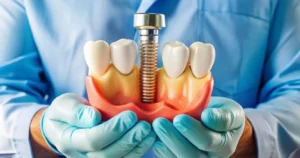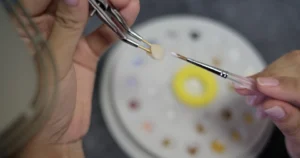Dental veneers are today’s modern approach to self-consciousness about having crooked teeth or stained teeth from years of smoking and drinking coffee. These veneers could be the perfect solution for your teeth problems.
But like any dental procedure, there are a few things to remember before getting dental veneers. Today, we’ll outline what they are, some of the most common problems veneers can fix, and how these veneers can help you eventually. So, let out your curiosity about veneers, and it does some magic for your imperfect teeth, read on!
What are Dental Veneers?
Dental veneers, also called porcelain veneers or dental porcelain laminates at times, are shells of wafer-thin, custom-made, tooth-colored materials. These veneers cover your teeth’ front surface, improving your appearance. These tooth shells are bonded to your front teeth and change their color, shape, size, or length.
Types of dental veneers can either be made from materials such as porcelain or resin composite. Porcelain dental veneers can resist stains better than those made from resin. They also mimic our natural teeth’s light-reflecting properties compared to resin veneers. It will always be great to discuss with your dentist what best choice of veneer material that can work for your dental condition.
Types of Problems Dental Veneers Fix
Dental veneers are commonly used in correcting and dealing with the following dental issues:
- A chipped tooth or broken tooth
- Dark teeth from root canal treatment
- Excessive fluoride
- Gaps between teeth
- Larger resin composite fillings
- Misaligned, crooked, uneven, or irregularly teeth
- Stains from medicines such as tetracycline or other antibiotics
- Smoking tobacco products
- Uneven or misshapen teeth
- Worn-down tooth
Procedure for Dental Veneers
Having dental veneers usually requires three (3) visits to your dentist’s clinic. The first one is for consultation, then the other two (2) are to make and apply the veneers. You can undergo one tooth or many teeth veneering processes all at the same time.
Dental examination and treatment planning
Initially, your consultation is to help assess your teeth and see if you are an ideal candidate for dental veneers. During this first visit, your dentist will explain the dental procedure and its limitations. They may also take helpful X-rays and impressions of your mouth and teeth for your dental veneers.
Teeth preparation
Preparation for porcelain veneers involves reshaping your tooth surface, equivalent to the thickness of the veneer that dentists will apply to it. Before removing the tooth enamel, your dentist will discuss with you the uses of anesthetics in numbing the treated area. They will take impressions of your tooth, then send them to their partner lab for processing.
Generally, dental veneers get returned from the laboratory within two (2) to four (4) weeks. You will be given temporary veneers from your dentist while waiting for your permanent ones.
Bonding
Your dentist will remove and trim the dental veneer as much as possible until it firmly bonds to your teeth. This step ensures that your veneers fit correctly and are color-matched to your original teeth. When necessary, dentists can alter the colors of dental veneers by adjusting the shade of the cement used for your veneers. Tooth installation involves cleaning, polishing, and etching.
Your dental veneers are attached to your tooth with dental cement. Once in place, the chemicals within the cement gels are activated using a special light that also makes them harden quickly. The last step involves your dentist removing excess cement, then examining your bite, and making any necessary adjustments.
Benefits of Dental Veneers
Dental veneers offer the following advantages:
- Provides a more natural-looking tooth appearance.
- Allows the gums to tolerate porcelain well.
- Porcelain veneers have stain resistance.
- The desired color for your veneers can be selected, making dark teeth appear whiter.
- No shaping is required as much as crowns need, yet they are more robust and look better.
Potential Risks from Dental Veneers
Downsides are also part of having dental veneers. These possible risks include:
- Dentists cannot undo the procedure.
- Veneers are pricier than composite resin bonding.
- Typically, dental veneers cannot undergo repair once chipped or cracked.
- Due to removing enamel, your tooth becomes more sensitive to hot and cold foods and drinks.
- Dental veneers may not exactly match your other teeth’s color. Also, dentists can no longer alter the veneer’s color. Do this step first if you plan on whitening your teeth.
- Though unlikely, veneers can still dislodge and fall off even after being put in place. To help minimize all chances of this incident, avoid biting your nails, chewing on pencils, ice, or other known hard objects. Otherwise, doing this step puts too much pressure on your teeth.
- Teeth with veneers can still decay and may necessitate the tooth’s full coverage with a crown.
- Veneers are not ideal for those with unhealthy teeth, weakened teeth, or for people who don’t have enough enamel currently existing on the tooth surface.
- People clenching and grinding their teeth are poor candidates and the most unideal for porcelain dental veneers. This tooth habit can cause dental veneers to start cracking or chipping.
Frequently Asked Questions About Dental Veneers
“How long do dental veneers last?”
Generally, dental veneers last between seven (7) and fifteen (15) years. After this period, you’ll need to replace your veneers.
“Do dental veneers need aftercare?”
Dental veneers don’t need special care. You must maintain good oral hygiene practices like brushing, flossing, and rinsing using antiseptic mouthwash as you would typically do. Although porcelain dental veneers resist stains, dentists may suggest that you avoid foods and beverages that can cause stains, such as tea, coffee, or red wine.
“What are some alternatives for dental veneers?”
Tooth bonding and crowns are some alternatives to dental veneers. Veneers are an excellent in-between option and maybe the best choice to change your teeth’s shape, more than a little bit. It is done with bonding, no longer requiring a crown since it can already be enough.
Final Thoughts
Dental veneers can help your natural teeth when you want to make sure you look the best at all times. These veneers can be excellent options for giving stained teeth a much-whiter or correct crooked teeth straighter when the previous imperfections, never becoming bothersome every time you smile. Discuss with your doctor or healthcare provider all about these veneers, so you can enjoy the perks you can have from dental veneers.
Do you need dental veneers for your dental needs? Our great friends at Luth and Heideman Center for Dental Care can help you today. Visit them now!https://lhdentalcare.com/






